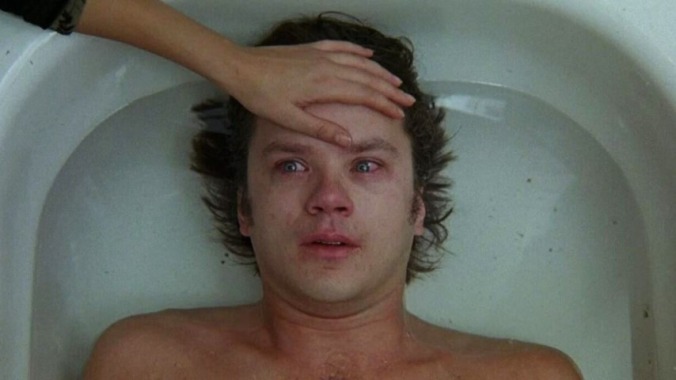ABCs of Horror 3: “J” Is for Jacob’s Ladder (1990)

Paste’s ABCs of Horror 3 is a 26-day project that highlights some of our favorite horror films from each letter of the alphabet. The only criteria: The films chosen can’t have been used in our previous Century of Terror, a 100-day project to choose the best horror film of every year from 1920-2019, nor previous ABCs of Horror entries. With many heavy hitters out of the way, which movies will we choose?
It is no great revelation to note that war is hell, but considering the way that generational military conflicts are able to haunt our psyches for decades to come, it’s actually sort of surprising that the American horror film genre has seemingly infrequently collided with the military/war movie. There are some, of course, using the backdrop of pop-culturally popular conflicts–by which we so often mean World War II–as their setting, if only because those rascally Nazis make for easy, recognizable villains, especially considering Hitler’s real-world fascination with the occult. The likes of Overlord, The Keep, Shadow in the Cloud or Frankenstein’s Army would fall into this category, but they tend to be relatively lightweight affairs–pulpy monster movies that aim to titillate more than genuinely horrify or disturb their audience. Many is the actual “war movie” that ultimately gets at the stress, shock and trauma of armed conflict and particularly the years that follow it, but few are the full-on horror movies that embrace these more mature, sober aspects. Except, of course, for Jacob’s Ladder.
Perhaps that’s why the 1990 psychological horror experiment from director Adrian Lyne still feels like such a novel one-and-only, 34 years later. Jacob’s Ladder, anchored by its empathetic lead performance from Tim Robbins, is a distressing, despairing, extremely painful journey through the mind and the soul, though one that also contains a kernel of hope. It’s powerfully acted from start to finish, imaginatively morbid, and never anything short of compelling. There’s nothing else quite like it, though it does share some DNA with the likes of Carnival of Souls or The Twilight Zone’s classic quasi-episode An Occurrence at Owl Creek Bridge. But even if some of this same territory has been previously touched on, it was never done so viscerally as it is here.
Robbins is playing American infantryman Jacob Singer, a Vietnam War vet living in 1975 New York, who several years earlier experienced the inexplicable and horrific destruction of his platoon during the conflict. Indeed, this is how we enter the film, in a genuinely disturbing ambush scene that we frequently return to in spurts throughout. What makes the sequence so unsettling isn’t necessarily the expected violence of bullets and bombs, however, but the elements you can in no way see coming–the way members of Jacob’s squad are seemingly struck down by other maladies in the chaos, like sudden seizures, pox and mental collapse, like plagues being visited on them from on high. This sense of sudden, divine (or infernal) retribution is positively eerie, as is the speed with which things entirely fall apart. One moment, there’s a squad of friends ribbing each other, building esprit de corps. The next moment, it’s a charnel house.
-

-

-

-

-

-

-

-

-

-

-

-

-

-

-

-

-

-

-

-

-

-

-

-

-

-

-

-

-

-

-

-

-

-

-

-

-

-

-

-








































